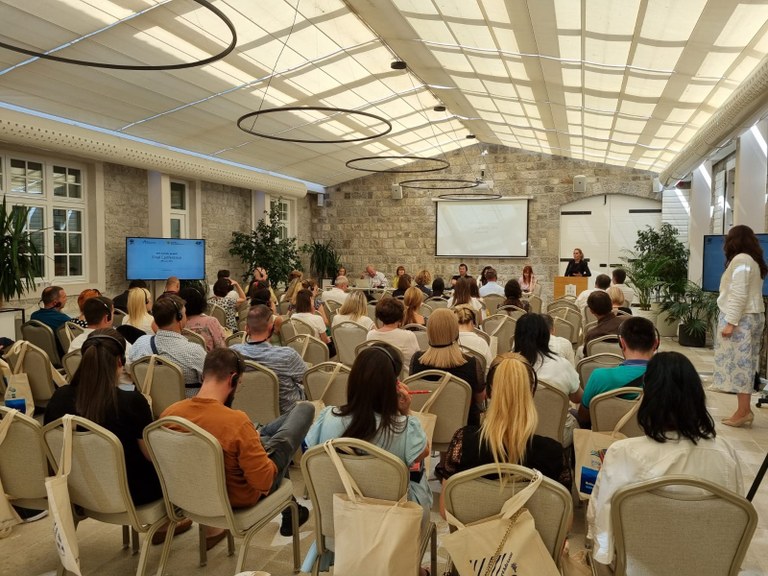GEF ADRIATIC: SUB-REGIONAL IMPACT AND WIDER BENEFITS
On 28 June 2021 the Ministry of Ecology, Spatial Planning and Urbanism of Montenegro hosted the final conference of the GEF Adriatic Project, funded by the GEF (under the “International Water” and “Biodiversity” focal areas) and implemented by the UNEP/MAP Coordinating Unit and the Regional Activity Centres PAP/RAC and SPA/RAC. Representatives of the relevant national institutions of Albania and Montenegro, the two countries where the project was implemented for three years, attended the conference held in the Montenegrin city of Herceg Novi to take stock of what has been achieved.
The project bolstered national efforts to implement the Ecosystem Approach in the Adriatic sub-region of the Mediterranean. This approach considers the relationships between all the different human interactions with the marine and coastal areas and the ecosystems on which they depend. These interactions are then incorporated into an overall plan for sustainable development using a tool know as Marine Spatial Planning (MSP).
Within the UNEP/MAP-Barcelona Convention system, the Ecosystem Approach refers to a roadmap (with milestones and a timetable) leading to the fulfillment of the vision of "a healthy Mediterranean with marine and coastal ecosystems that are productive and biologically diverse for the benefit of present and future generations". As part of this roadmap, the Contracting Parties have adopted eleven Ecological Objectives that address key elements of the Mediterranean marine and coastal environment. These objectives constitute the backbone of a harmonized regional system that allows UNEP/MAP and the Contracting Parties to take the pulse of Mediterranean ecosystems: the Integrated Monitoring and Assessment Programme of the Mediterranean Sea and Coast and Related Assessment Criteria (IMAP).
Adopted by the Contracting Parties in 2016, IMAP has transformed the way in which monitoring and assessment of the status of the marine and coastal environment are conducted. UNEP/MAP Components, including PAP/RAC and SPA/RAC support Mediterranean countries in this endeavor.
“We received a considerable boost to our national conservation obligations under the Barcelona Convention by working with GEF Adriatic, which also helped develop our EU candidacy requirements. We have significantly increased our national capacities to assess, monitor and manage our marine resources in Montenegro’s first ever large-scale marine spatial planning process,” said Ivana Stojanovic of the Ministry of Ecology, Spatial Planning and Urbanism of Montenegro.
Zamir Dedej of the National Agency for Protected Areas of Albania, Ministry of Tourism and Environment of Albania, said: “Our marine environment is a priceless national resource, and we need to do more to preserve it. The GEF Adriatic project proved to be a great opportunity to begin managing the Adriatic with the integrated overall vision such an aim requires. The marine surveys and monitoring that have taken place provide an excellent foundation for future Marine Spatial Planning in Albania and beyond.”
The project strengthened national capacity for sub-regional marine management through targeted demonstration of successful tools and practices in both countries. Marine field surveys aligned with IMAP were implemented, along with the preparation of the first integrated monitoring programmes. Science-based assessments towards the achievement of Good Environmental Status were also conducted in line with IMAP INFO system, the information system underpinning the exchange of data and information among the Contracting Parties to the Barcelona Convention. In Montenegro, a national process of MSP was initiated with the project’s support.
The project has fostered collaboration by bringing a wide range of actors (government, academia, business and civil society) together to address the impact of socio-economic activities, including those related to the blue economy, on natural systems.
The deployment of research initiatives to enhance the collective understanding of environmental degradation processes, including those driven by non-indigenous species, marine litter, pollution, and climate change, provides a basis for targeted marine protection initiatives and more effective long-term MSP. The GEF Adriatic project has notably spurred plans for the development of a new marine research centre in Albania.
“The GEF Adriatic project has had a powerful demonstrative impact that will reverberate well beyond the Adriatic, particularly in promoting Marine Spatial Planning processes based on the Ecosystem Approach,” Tatjana Hema, Acting Coordinator, UNEP/MAP-Barcelona Convention Secretariat said. “Ensuring Good Environmental Status in the Mediterranean Sea and coasts, supporting the restoration of ecosystems and ensuring that everyone can benefit from their services fairly and sustainably is at the core of our long-standing partnership with the GEF,” Ms. Hema added.

